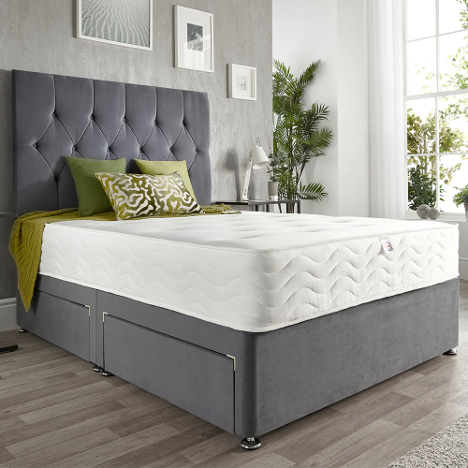In a world where innovation touches every corner of our lives, our beds are no exception. From smart sensors to cooling fabrics, modern mattresses and sleep gadgets are redefining rest. For consumers seeking healthier, more supportive solutions, spring-free mattress options have become the foundation of this transformation. These new-age products offer comfort, convenience, and customization that traditional beds simply can’t match.

Let’s explore the exciting trends in sleep technology that are reshaping how we rest — and why embracing these innovations might be the key to better sleep and improved well-being.
1. Smart Mattresses and AI-Driven Sleep Tracking
One of the most significant advances in sleep technology is the smart mattress. Equipped with sensors and sometimes even artificial intelligence (AI), these mattresses monitor sleep cycles, body temperature, movement, and even heart rate. The data collected can be synced with mobile apps, giving users detailed insights into their sleep patterns.
Smart mattresses like Eight Sleep or Sleep Number offer features such as:
- Automatic firmness adjustment
- Zoned support for pressure relief
- Real-time biometric feedback
- Integration with smart home ecosystems
With AI continuously learning from sleep habits, these beds offer a dynamic sleep experience tailored to individual needs. No more one-size-fits-all sleep — now your mattress knows you.
2. Spring-Free Mattress Designs: Comfort Without Compromise
Traditional innerspring mattresses are being replaced by spring-free mattress options that offer better spinal alignment, fewer pressure points, and improved durability. These include:
- Memory foam mattresses: Contour to the body and relieve pressure
- Latex mattresses: Naturally resilient and breathable, ideal for hot sleepers
- Hybrid designs: Combine foam or latex with micro-coils for added support
Spring-free beds eliminate the issues of squeaking springs and uneven wear. They also reduce motion transfer, making them ideal for couples. As more people seek orthopedic support and motion isolation, spring-free designs continue to lead the sleep revolution.
3. Temperature Regulation and Cooling Materials
Overheating at night can disrupt deep sleep stages. That’s why many modern sleep products now include temperature-regulating technologies. These may involve:
- Phase-change materials (PCMs) that absorb and release heat
- Breathable cover fabrics that wick away moisture
- Gel-infused foams that stay cooler longer
Smart beds can even warm or cool specific zones based on the user’s preference or body temperature readings. For example, couples can each set their side of the bed to a different temperature. This eliminates the classic “too hot vs. too cold” bedtime battle.
4. Adjustable Bases: Personalized Sleep Posture
Adjustable bases are no longer just for hospitals or seniors. They’ve become a sought-after feature for tech-savvy sleepers of all ages. These bases allow users to raise the head or foot of the bed, relieving pressure on the back, improving circulation, and reducing snoring.
Some advanced bases now include:
- Massage functionality
- USB ports for charging devices
- Under-bed lighting
- Preset modes (e.g., zero gravity, TV watching)
Pairing an adjustable base with a flexible, spring-free mattress enhances the entire sleep setup and allows for customized positioning to suit specific health needs or lifestyle preferences.
5. Eco-Friendly and Sustainable Sleep Solutions
Consumers are increasingly concerned with what goes into their beds — and how those materials affect the planet. This trend has led to the rise of sustainable mattresses made from:
- Organic cotton
- Natural latex
- Bamboo fabrics
- Recycled materials
Certifications like GOTS (Global Organic Textile Standard) and CertiPUR-US® help consumers identify non-toxic, responsibly sourced products. Many spring-free mattress options now meet or exceed these standards, offering peace of mind along with comfort.
Sustainability also extends to packaging, with brands using vacuum-sealed, recyclable boxes and offering mattress recycling programs.
6. Sleep Tech Accessories: Beyond the Mattress
Innovative comfort doesn't end with mattresses. A new wave of sleep-enhancing accessories is reshaping bedtime routines. These include:
- Smart pillows that adjust firmness and monitor breathing
- White noise machines with customizable soundscapes
- Weighted blankets designed to reduce anxiety
- Blue light-blocking lamps and alarm clocks that simulate natural light
Together, these products form a holistic sleep system aimed at improving not just how we sleep, but how we wind down and wake up.
7. Customization and Direct-to-Consumer Innovation
Today’s sleep tech industry prioritizes personalization. Whether it’s choosing firmness, mattress height, material composition, or smart features, many brands now offer custom builds. Thanks to direct-to-consumer models, customers can easily order online, take advantage of sleep trials, and enjoy white-glove delivery — all at lower costs than traditional retailers.
Subscription-based services are also emerging. Some companies offer mattress “upgrades” every few years, or deliver fresh pillows and accessories regularly to maintain optimal sleep hygiene.
8. Sleep Data and Health Monitoring Integration
Sleep is one of the most important pillars of health, and smart devices are helping people understand its impact. Wearables like Oura rings, Fitbit, and Apple Watches can now sync with smart beds and sleep apps, giving users a 360-degree view of their health.
By tracking:
- REM and deep sleep durations
- Breathing irregularities
- Sleep interruptions
… users can make informed decisions about bedtime habits, caffeine intake, exercise routines, and even stress levels.
Soon, AI algorithms may begin offering predictive health alerts, based on subtle sleep changes — allowing earlier detection of conditions like sleep apnea or heart irregularities.
Final Thoughts: The Future of Rest is Intelligent, Adaptive, and Sustainable
As technology continues to evolve, our approach to sleep is evolving with it. No longer a passive routine, sleep is now a science-backed, tech-enhanced experience that can be optimized for health, comfort, and personal preference.
Whether it’s through spring-free mattress options, smart temperature controls, or AI-powered insights, today’s innovations are empowering people to sleep deeper, wake up refreshed, and live better. For those ready to invest in better rest, the future of sleep isn’t just a dream — it’s a reality.
.jpg?w=600)






